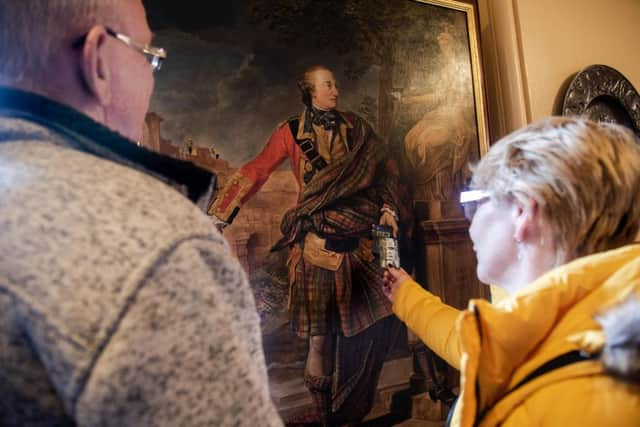Robert Burns bust fitted with contactless reader for fundraiser


A replica bust of Robert Burns at the poet’s Birthplace Museum in Alloway has been fitted with a contactless card reader in a major new fundraising effort launched by the National Trust for Scotland.
Now, visitors will be able to press their card in to the hand of the bard to make a £2 donation to the organisation.
Advertisement
Hide AdIt is one of two replica artefacts produced by the NTS as part of its “Tap the Past to Preserve the Future” campaign.
In Aberdeenshire, donations can be made by tapping a replica of the famous 1766 portrait of Colonel William Gordon, British military general and courtier, at Fyvie Castle near Turriff.
Simon Skinner, chief executive at the National Trust for Scotland, said the use of the new technology came as the volume of traditional cash donations continues to fall.
He said: “Like all charities, we face a significant fundraising challenge as cash donations have fallen sharply in recent years. This initiative could not come at a more crucial time and will enable us to accept contactless donations at our sites for the first time.
“It’s only through the support of our visitors, members and donors that our charity can help to protect Scotland’s natural and national treasures, like Robert Burns Birthplace Museum and Fyvie Castle, for everyone to enjoy.”
The replica pieces have been weeks in the making, with the replica 19th-century bust of Burns formed using the latest in 3D scanning technology to accurately capture every detail of the original.
Advertisement
Hide AdThe makers worked closely with the Trust’s property and curatorial staff to create high quality replicas which are almost identical to the original pieces - but with the contactless card reader integrated into the piece.
According to research by UK Finance1, use of notes and coins dropped by 15 per cent last year. Meanwhile contactless debit and credit card payments increased by 97 per cent during 2017 to 5.6 billion, with almost two-thirds of people in the UK now making contactless payments.
Advertisement
Hide AdRicky Diggins, network director at Bank of Scotland, which has collaborated on the project, added: “Bank of Scotland has been at the heart of local communities across Scotland for over three centuries and we are proud to share the National Trust for Scotland’s deep passion for the heritage of our country.
“In 1786, Robert Burns composed a poem on the back of a Bank of Scotland note, so it is fantastic to see a recreation of him now accepting contactless donations, helping to preserve treasured historical sites in Scotland.”
Burns wrote the poem lamenting his reliance on money and the prospect of leaving Scotland for Jamaica to work, a trip he never made.